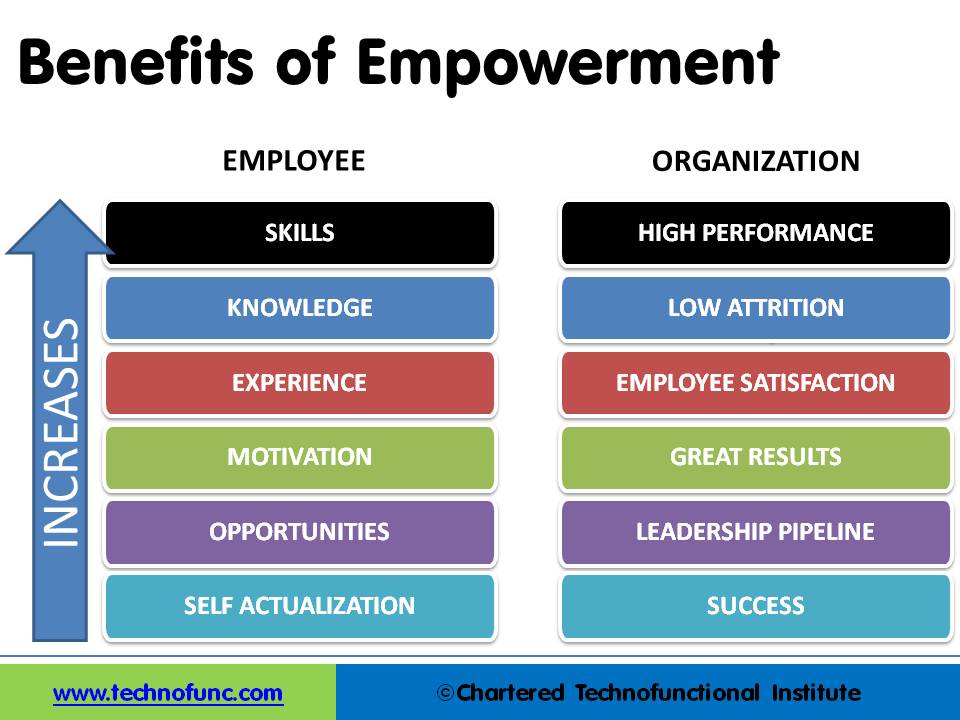- Home
- Business Processes
- Industry Knowledge
- Aerospace Industry
- Automotive Industry
- Banking Domain
- BFSI Industry
- Consumer/ FMCG Industry
- Chemicals Industry
- Engineering & Construction
- Energy Industry
- Education Domain
- Finance Domain
- Hospitality Domain
- Healthcare Industry
- Insurance Domain
- Retail Industry
- Travel and Tourism Domain
- Telecom Industry
- Leadership Skills
- eLearning
- Home
- Leadership
- Team Leadership
- Benefits of Empowerment
Benefits of Empowerment
Teams are certainly very relevant and important elements in today’s high-performance organization but the important thing to remember as a leader is that we can’t simply rely on putting highly effective individuals together to make a highly effective team. Empowerment increases the effectiveness of the team and drives many intangible benefits both for the organization and the employees.
Effective teams often require the right mix of people, skills, resources, and a focus on building good working relationships. Empowering your team members allows leaders to utilize the skills, knowledge, experience and motivation of their entire talent base. Let’s understand how to empower your team members to achieve great wins!
What is Empowerment?
Empowerment is the authority or power given to someone to do something. Empowerment refers to the delegation of some authority and responsibility to employees and involving them in the decision-making process, not in mere job activities, but rather at all the levels of management. Empowered employees develop loyalty and trust and they are proud to be working for the company and are eager to contribute to company success. People can be “empowered” to make decisions at work. They can be “empowered” to speak up with new ideas. Employees can also be “empowered” to act when the integrity of the organization is at stake.
Benefits to the Employee
Empowerment provides new opportunities to your team members to develop and stretch beyond their current capabilities and acquire new skills. It helps in increasing their motivation level, creates new opportunities to develop their leadership skills and satisfy their self-actualization needs. Empowered employees have increased self-confidence, are keen to develop their own skills, and also to find ways to make use of those skills to the company's benefit.
It brings a sense of ownership to the employee due to which he personalizes the goals and objectives of the organization and associates his success with his own abilities. Also, the performance of the employee improves as he attaches self-induced rewards with his performance by making decisions pertaining to the problem and sees the results (success) that follow.

Benefits to the Organization
On the other hand, it brings immense benefits to the organization and to the project or the program. Performance increases, people feel more satisfied and there is low attrition. You can achieve great results and exposure builds the leadership pipeline for your organization. Empowerment is all about mutual success where everyone wins.
Empowerment increases the organization’s responsiveness towards the problems or issues. Also, there is an increase in the productivity of an employee as he is completely engaged with the firm and takes decisions for the betterment of the organization as a whole. The benefits are numerous and well-documented — happier, more productive employees, a higher level of engagement, enhanced customer service, reduced stress, increased innovation, more pride and loyalty, less stagnancy, and an organization that is more adaptable to change. Plus, it just makes the workplace more pleasant for everyone.
Empowering your team is not difficult, but it does require a conscious effort. A tremendous shift in thinking is required by both leaders and professionals to make empowerment work.
Related Links
You May Also Like
-
A manager or an employee in an organization who is experiencing a high level of stress may develop high blood pressure, ulcers, irritability, difficulty in making routine decisions, loss of appetite, accident proneness, and the like. These can be subsumed under three general categories, physiological, psychological, and behavioral symptoms. Stress can give rise to a number of changes.
-
Time management is the process of planning and exercising conscious control of time spent on specific activities, especially to increase effectiveness, efficiency, and productivity. The best time management techniques improve the ways you work. Time management refers to managing time effectively so that the right time is allocated to the right activity. Learn more about the five steps for effective time management viz. study, identify, analyze, decide, and implement.
-
The development of teams is an ongoing process because the composition of the team may keep on changing. The new members may join and the old members may leave the team. The team members pass through several stages for the development of the team and there has been a lot of research to identify these stages. In this article, we discuss the common theories of team development.
-
All the teams are dynamic in nature and they take time to come together, they form, develop, and grow in stages, over a period of time. Teams go through five progressive stages: Forming, Storming, Norming, Performing and Adjourning. In this article, we want to introduce you to these stages of team development and certain strategies that you can use to help the team grow and develop in each of these stages.
-
In today's innovation-driven economy, understanding how to generate great ideas has become an urgent managerial priority. Managers need to encourage and champion ideas and need to help their organizations incorporate diverse perspectives, which spur creative insights and facilitate creative collaboration by harnessing new technologies. Innovation is the embodiment, combination, and/or synthesis of knowledge in original, relevant, valued new products, processes, or services.
-
Team leadership theory is a recent leadership theory that does not discriminate between the leader and the other team members. The approach considers contributions from each team member to be critical for organizational success. This approach focused on the overall team effectiveness and team problems are diagnosed and action is taken to remediate weakness. This approach provides for taking corrective action when the leader deems necessary.
-
Team Foundation in Forming Stage
This is the first stage of team development. This is the stage when the foundation of the team is laid. During the Forming stage, team members have a high dependence on their leader for guidance. Learn the practical strategies you can use during this stage to help your team develop into a highly effective performing team.
-
Concept & Definition of Stress
Stress is a popular expression used by people in day to day life. Pressures of day to day living sometimes necessitate coping or dealing with them and stretch the body beyond its natural capacity. They are called stressors. Stress is a natural, ongoing dynamic, and interactive process that takes place as people adjust to their environment.
-
Many different types of teams have been identified by social scientists. Managers may encounter the diverse types of challenges while managing different kinds of teams. Challenges associated with Cross-Functional Teams might be different from that of a Geographically Dispersed Team or a Virtual Team. This article explores some common categories and subtypes of teams.
-
Evidence of the medically damaging symptoms of work stress necessitates applying the treatment of stress management. Stress management is increasingly drawing the attention to the management experts not only as a remedial measure but also as a way to resource management. If the workplace can be made a little more lovable the increase in the achievement of the organization may be much time more. If group stress can be removed by introducing group discussions and recreational facilities a long-lasting team spirit may get developed.
Explore Our Free Training Articles or
Sign Up to Start With Our eLearning Courses

About Us
Learning
© 2023 TechnoFunc, All Rights Reserved










